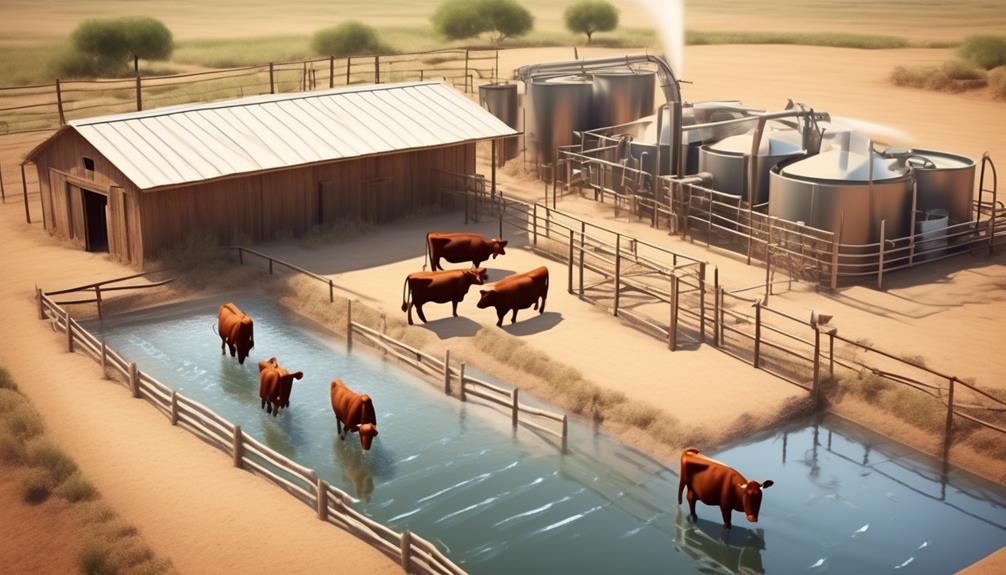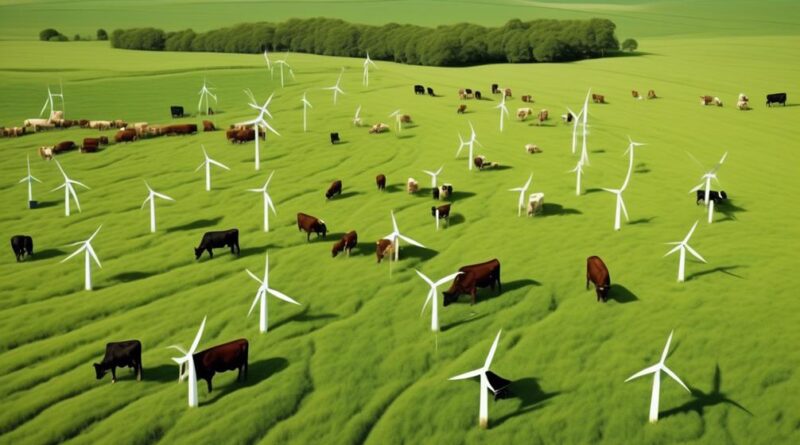Why Choose Sustainable Practices in Beef Production?
You may not be aware that the beef industry has a significant impact on the environment, but have you ever considered why choosing sustainable practices in beef production is becoming increasingly important?
The reasons go beyond just environmental concerns. By making sustainable choices in beef production, you can positively affect resource conservation, animal welfare, economic viability, and more.
These factors not only impact the quality of the beef you consume but also have far-reaching effects on the world around you.
Environmental Impact
When considering the environmental impact of beef production, it's important to acknowledge the significant role it plays in contributing to greenhouse gas emissions and deforestation. However, there are sustainable practices that can be implemented to address these issues.
Reducing emissions is a crucial aspect of sustainable beef production. By optimizing cattle diets and improving their digestion, methane emissions can be minimized. Additionally, proper manure management and utilization of methane digesters can help capture methane emissions, converting them into renewable energy. These steps not only reduce greenhouse gas emissions but also contribute to minimizing waste.
Minimizing waste is another key factor in sustainable beef production. This involves efficient use of resources such as water, energy, and feed. Implementing precision feeding techniques can help reduce feed waste and optimize nutrient utilization by the cattle, thereby decreasing the overall environmental impact. Furthermore, water conservation methods, such as utilizing drip irrigation systems and capturing rainwater, can help minimize water usage in beef production. Energy-efficient practices, like utilizing renewable energy sources and optimizing machinery usage, also play a vital role in reducing waste and mitigating environmental impact.
Resource Conservation
To ensure sustainable beef production and address environmental concerns, implementing resource conservation measures is essential. By focusing on energy efficiency and waste reduction, you can significantly minimize the ecological footprint of beef production. Adopting energy-efficient practices, such as utilizing renewable energy sources and optimizing machinery, reduces the overall environmental impact of beef production. Additionally, implementing waste reduction strategies, such as composting organic waste and minimizing packaging, further contributes to resource conservation and environmental sustainability.
Biodiversity preservation and responsible land use are crucial aspects of resource conservation in beef production. By preserving natural habitats and implementing sustainable land management practices, you can help safeguard the diverse ecosystems that support wildlife and contribute to overall environmental health. Responsible land use also involves avoiding deforestation and minimizing habitat destruction, which are vital for maintaining ecological balance in beef production areas.
Considering resource conservation in beef production not only benefits the environment but also supports the long-term viability of the industry. It underscores the importance of using resources efficiently, minimizing waste, and safeguarding biodiversity and natural landscapes. By implementing these measures, you actively contribute to the preservation of natural resources and the promotion of sustainable beef production practices.
Animal Welfare
Ensure that animal welfare standards are consistently maintained throughout all stages of beef production to prioritize the well-being of livestock. Ethical treatment of animals is a fundamental aspect of sustainable beef production. By ensuring proper care and ethical treatment of livestock, you contribute to the overall health and well-being of the animals while also enhancing the quality of the final beef product. Implementing animal welfare practices involves providing adequate space, proper nutrition, and access to clean water. It also entails minimizing stress during transportation and handling, as well as ensuring humane slaughter methods.
Prioritizing animal welfare in beef production isn't only ethical but also contributes to the sustainability of the industry. When animals are well-cared for, they're healthier, which reduces the need for antibiotics and other medications, ultimately leading to a reduction in the environmental impact of beef production. Furthermore, ethical treatment of animals aligns with consumer preferences, as many individuals are increasingly concerned about how animals are treated in the food production process. By meeting these ethical expectations, beef producers can build trust with consumers and secure a strong market position.
Economic Viability
Considering the financial aspects of beef production, it's essential to evaluate the economic viability of various practices and investments to ensure long-term sustainability. When focusing on economic viability, two key factors come into play: cost efficiency and marketability opportunities.
- Cost Efficiency: Implementing sustainable practices can lead to cost savings in the long run. For instance, investing in improved grazing management not only benefits the environment but also reduces input costs by maximizing the use of existing resources. Additionally, utilizing renewable energy sources and repurposing waste materials can significantly lower operational expenses.
- Marketability Opportunities: Embracing sustainable practices opens doors to new market opportunities. Consumers are increasingly seeking out sustainably produced beef, creating a growing market demand. By adhering to sustainable standards, producers can access premium markets and differentiate their products, ultimately commanding higher prices and increasing profitability.
Incorporating sustainable practices into beef production not only aligns with ethical and environmental considerations but also provides significant economic benefits. By carefully considering cost efficiency and capitalizing on marketability opportunities, producers can ensure the economic viability of their operations while contributing to the long-term sustainability of the beef industry.
Consumer Demand
Embracing sustainable practices in beef production can directly meet the increasing consumer demand for ethically and environmentally conscious meat products. In recent years, consumer awareness regarding the impact of food production on the environment and animal welfare has significantly increased. As a result, market trends indicate a growing preference for sustainably produced beef.
Consumers are actively seeking out information about the origins of their food and are willing to support producers who prioritize ethical and environmentally friendly practices. With the rise of social media and accessible information, consumers are now more informed about the environmental and ethical implications of their food choices. This has led to a shift in consumer preferences, with many individuals actively seeking out beef products that are sourced from farms employing sustainable practices.
As a result, there's a notable increase in demand for beef that's produced in an environmentally responsible manner, with a focus on animal welfare and reduced carbon footprint. Responding to this demand by implementing sustainable practices in beef production not only aligns with consumer values but also presents an opportunity for producers to cater to a growing market segment.
Soil Health
With the increasing consumer demand for ethically and environmentally conscious meat products, maintaining soil health is essential for sustainable beef production. Soil health directly impacts the quality of the forage consumed by cattle and influences the overall sustainability of beef production.
Here's why soil health is crucial:
- Soil Fertility: Healthy soil is rich in essential nutrients and microorganisms that support the growth of nutritious forage. By maintaining soil fertility through organic practices such as crop rotation and the use of natural fertilizers, beef producers can ensure the availability of high-quality forage for their cattle. This not only contributes to the health and well-being of the animals but also enhances the nutritional value of the beef produced.
- Carbon Sequestration: Implementing sustainable soil management practices can facilitate carbon sequestration, aiding in the reduction of greenhouse gas levels in the atmosphere. This is achieved through methods such as minimal soil disturbance, maintaining permanent vegetation cover, and integrating agroforestry practices. By sequestering carbon in the soil, beef producers can play a significant role in mitigating climate change while enhancing the overall health and resilience of the ecosystem.
- Water Retention and Filtration: Healthy soil has better water retention and filtration capabilities, reducing the risk of erosion and nutrient runoff. By promoting soil health, beef producers can contribute to the conservation of water resources and the protection of surrounding ecosystems.
Water Management

Maintaining effective water management practices is crucial for sustainable beef production. It ensures efficient utilization of water resources and minimizes environmental impact. When it comes to water management in beef production, irrigation efficiency and drought resistance are paramount.
Efficient irrigation systems such as drip or pivot irrigation can significantly reduce water wastage and promote sustainable water use. These systems deliver water directly to the roots of plants, maximizing water absorption and minimizing evaporation. Additionally, drought-resistant forage crops can be strategically planted to minimize the reliance on irrigation. This conserves water and enhances the resilience of the ecosystem during water scarcity.
Water conservation is essential not only for the sustainability of beef production but also for the preservation of the surrounding ecosystem. Implementing water conservation practices, such as rainwater harvesting and recycled water usage, can help minimize the environmental impact of beef production.
Capturing and utilizing rainwater for irrigation purposes reduces the demand for freshwater sources. Recycled water can be used for non-potable purposes, thus reducing the overall water consumption.
Climate Resilience
To enhance climate resilience in beef production, prioritize the selection of forage crops that demonstrate adaptability to varying weather conditions. By incorporating adaptable forage crops into your beef production practices, you can better prepare your operation to withstand the impacts of climate change.
Additionally, consider implementing the following adaptation strategies to further enhance climate resilience:
- Diversify forage crops: Plant a variety of forage crops with different growth patterns and optimal weather conditions. This diversity can help ensure that at least some of your crops will thrive, even in unpredictable or extreme weather events.
- Improve grazing management: Implement rotational grazing practices to allow forage crops to recover and adapt to changing conditions, ultimately improving their resilience to climate variability.
- Enhance soil health: Healthy soils can better retain moisture and nutrients, which is crucial during periods of drought or excessive rainfall. Consider practices such as minimal tillage, cover cropping, and compost application to improve soil health and increase climate resilience.
In addition to these adaptation strategies, focusing on carbon footprint reduction can contribute to climate resilience in beef production. By reducing the carbon footprint of your operation, you can help mitigate the impacts of climate change and contribute to a more sustainable environment for your beef production.
Frequently Asked Questions
What Are the Long-Term Effects of Sustainable Beef Production on Local Ecosystems and Biodiversity?
Choosing sustainable beef production positively impacts local ecosystems and biodiversity in the long term. By prioritizing ecosystem health and conservation efforts, sustainable practices help maintain local biodiversity and ensure the long-term health of the environment.
How Does Sustainable Beef Production Contribute to Community Development and Social Equity in Rural Areas?
Sustainable beef production fosters community empowerment by creating local job opportunities and supporting rural economies. It promotes social inclusion by prioritizing fair labor practices and engaging with diverse stakeholders to ensure equitable benefits for all.
What Specific Practices Are Implemented to Ensure the Well-Being and Mental Health of the Animals in Sustainable Beef Production?
To ensure the well-being of animals in sustainable beef production, specific practices like providing ample space, access to clean water, and natural grazing are implemented. Mental health initiatives include reducing stress and ensuring a comfortable environment.
How Does Sustainable Beef Production Impact the Overall Profitability and Stability of Small-Scale Farmers and Ranchers?
Sustainable beef production can positively impact the profitability and stability of small-scale farmers. By implementing sustainable practices, you can reduce production costs, improve resource efficiency, and enhance the long-term viability of your operation.
What Measures Are Taken to Ensure That Sustainable Beef Production Meets the Cultural and Dietary Needs of Diverse Consumer Populations?
To meet cultural diversity and dietary requirements, sustainable beef production incorporates diverse farming practices and engages with local communities to understand and fulfill their specific needs. This ensures that beef production aligns with cultural and dietary preferences of diverse consumer populations.
Conclusion
So, why choose sustainable practices in beef production?
Because it's better for the environment, conserves resources, and improves animal welfare.
It also makes economic sense, meets consumer demand, and promotes soil health.
In addition, sustainable practices in beef production manage water effectively and build climate resilience.
Overall, it's a win-win for everyone involved, from producers to consumers and the planet.
Make the choice for sustainability in beef production and contribute to a healthier and more sustainable future.
